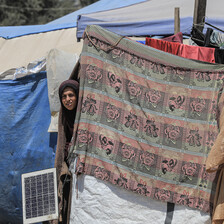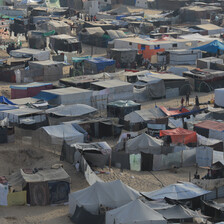The Electronic Intifada 23 December 2024

Al-Mawasi is full of people forced to flee their homes.
APA imagesThe days of the Israeli genocide on Gaza bleed into one another, but none of them look the same.
Each day has its own harsh conditions, unwelcome challenges, new losses and new trauma.
In the morning, I am usually holding a tray of mismatched cups and a tea pot. Barefoot, I head to wash them lost in thought about how to pass the annoying neighbor in another section of the barn without saying “good morning” as I walk along the corridor.
How could I say “good morning” to those causing me to wake up at a time that I don’t want to? The neighbor seems unable to hush her infant or at least try to figure out why her baby is crying.
This is the fourth displacement for my family. I am from Gaza City, but due to the Israeli attacks, my family and I have been displaced to different places in different cities.
The fourth displacement on 31 May 2024 has us living in a barn in al-Mawasi, southern Gaza, that animals used to live in.
I remember my sister joked with me and said, “Israa, guess what? Our new home will be a barn. Don’t get upset, we were lucky to get the sheep barn.”
She played the “Shaun the Sheep” song to make me feel better.
I laughed and then she added, “Our new neighbors, they will be the chicken people. It’s a huge place. And you know who is the real winner, the neighbor who took the old feed trough!”
Her joke was supposed to cheer me up because to many others and her, a barn is way better than living in a tent. Instead what my sister said brought tears and made me wonder, “When will I be home again?”
Our barn has been divided into two sections. One is for “us,” and the other is shared by our former neighbors.
When I say “us,” I don’t refer to a relatively small family: my sister, mother, two brothers and me. I refer to four families: eight men, eight women and eight kids sharing a small area with the men in one part and women and children in another.
The crowded conditions have added to my sense of loss.
Losing privacy
I miss my own “me time” in the morning. I used to wake up before everyone else in the house in Gaza City to make breakfast, accompanied only by the sound of birds chirping from the henna tree.
Now, the sounds of birds are replaced by the noise of children playing and mothers grumbling.
A cup of organic juice is replaced by a cup of tea I don’t particularly enjoy.
The comfortable couch is replaced by a hard wooden chair that aches my back.
The luxury of sitting alone in the morning, journaling or watching YouTube videos, simply no longer exists.
I can’t believe that I left my privacy behind.
Why isn’t privacy a soft thing to carry in your bag?
Why isn’t it just another blanket to put over your body?
Where did I leave my privacy?
I know that I lost it somewhere but don’t remember where.
Is it my fault for not taking it with me? Why did I say that I would go back?
Before the Israeli military invasion, I would always be the last person to leave our home, making sure that every single door was securely locked.
I didn’t have the pleasure on the day my family and I were forced to evacuate our home on 7 October 2023. My brothers were in charge of this mission; they put all of us in a small car filled with basic home supplies that we thought we needed for a day because we believed that we would go back home in the afternoon.
At that moment, the only thing I was thinking about was whether I would survive, and I was assuring myself that I would be home again soon.
But now, the possessions I left behind are just a distant memory. In wartime, there are always replacements for anything.
Makeshift doors
The so-called doors where I live nowadays are either pieces of fabric or nylon tarps. They are not serving as actual doors, as they are easily opened, with no keys.
Anyone can enter without further notice. The doors are too flimsy to knock on.
They don’t keep out the constant camp noise.
The feeling of being watched and monitored all the time is almost unbearable.
For me, doors were never just an object. I would often take photos of them and save any photo of doors I would see online.
There was always a chemistry between them and me.
I greatly value privacy and was raised in a relatively quiet house.
I enjoy drawing doors in my journal and taking photos of them. I often stop to stare and appreciate the beauty of those that catch my eye as I am walking.
Occasionally, I decorate the doors in the places I have lived. I do so with care and love as they have provided privacy, “me time” and escape from the harsh world we Palestinians have been living in.
Taking a shower
In my third displacement, which was to Deir al-Balah in central Gaza, my family and I lived in a building with two floors and four rooms per floor. There wasn’t a single door, not even a simple curtain for privacy.
Whenever someone wanted to take a shower, we held a piece of fabric that we used for cover when sleeping. I would ask someone I trusted, usually my mother or sister, to hold the fabric for five to 10 minutes, as I washed myself from water in a bucket.
We used the fabric door when changing clothes as well.
In Deir al-Balah I met a girl at the freelancing hub that provided free internet who said that whenever she wanted to have a shower, she went to a friend’s house because she did not want to use the public camp bathroom. She also said she didn’t take a shower for almost a month before she asked her friend to use her bathroom.
More than 50 people shared the one bathroom where I was living. I often waited in line for up to three hours for the water to be heated, but by the time it was my turn to shower, the water had become cold again.
In war, getting water is often a constant challenge. My family and I were lucky that my uncle had discovered a well nearby. Yet it was a shared resource for almost hundreds of hands.
Getting to the well took only two minutes, but the wait in line to fill a 20 liter bucket could be as long as 30.
I needed to hold the well hose and move it from up to down in a concise way to push water from it. This caused pain in my arms from the repetition of the process.
My hands would become red and numb from the weight of the hose, and I struggled to lift the bucket. I would always get the water splashing out from it.
For me, each drop I lost when the water spilled brought a lump in my throat.
You were not expected to spend more than 10 minutes taking a shower or using the bathroom. Some of those who complained that I was taking too much time likely did not have a clue that taking a shower was also one of the few ways in the camp to get some “me time.”
Heating the water
There are two main ways to heat the water, it seems: either using the sun or fire.
Using the sun method, I would pour the water into bottles and put them outside to be heated by the sun’s rays.
This required constant monitoring, as I had moved the bottles to where the sunshine was at its most powerful and watched out for would-be thieves. Children would use the water to create mud to play with while others would take the water because they were too lazy to go to the well themselves.
When using the fire method to heat water, I constantly worry about keeping the fire alive and the poor quality of the wood that was available.
We had earlier run out of good, dry wood and what we use now is the wood we buy from the market. It has often been taken from destroyed houses and is of poor quality.
Now, I wonder whether my eyes will ever heal from all the smoke stinging them.
There is no single door to shut on yourself, to hide behind as you let your emotions out, to speak out or even to cry. To tell yourself how badly you miss the little things you don’t have.
My “me time” is on the verge of extinction.
Israa Alsigaly is a writer and translator in Gaza.




